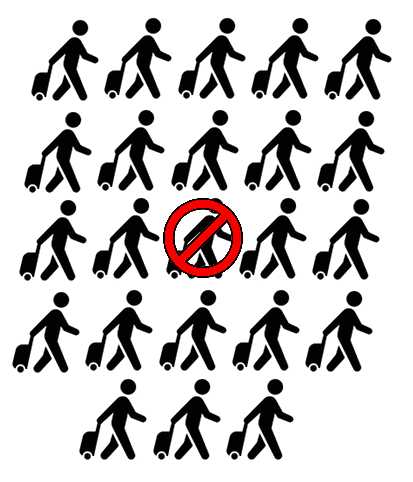
Freedom is a privilege, captivity is the rule
Puzzled: nation - or prison?
Reading the news coming out of Malaysia lately, it's easy to be confused and wonder: Is Malaysia a nation, or just one big prison? For example:
-
"Clean" yellow t-shirts are banned,
as a national security threat - with an even more absurdly ironic twist added:
A Malaysian government spokesman declined to comment on the case but insisted that citizens were free to speak their minds.
“The reality in Malaysia is that there is freedom of expression without fear of prosecution,” he said, speaking on the condition of anonymity. - The prime minister is, like, a way, way Serious Dude. Like, DO NOT step to him with frivolous crap like balloons. And he definitely can't relate to clowns, or beauty product ads. Even if he never sees it, he gets insulted and offended - and you get arrested.
- And don't forget: you can also get arrested for posting a complaint on a Complaint Community Facebook page.
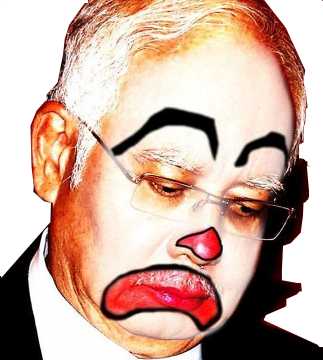
Puzzle solved
Well now we can all relax, because the government of Malaysia has made it clear: Malaysia is indeed just one big prison.
May 15:
The news first began to leak when Maria Chin Abdullah, chairperson of Bersih 2.0 (a coalition of NGOs that works on electoral reform in Malaysia), checked in for a flight to South Korea to accept a human rights award on behalf of the group. That's when she was told that she was barred from travel. No explanation was given, except that the instruction was from the federal government.
May 16:
Now for most of us, the matter would have ended right there, with that command from The Almighty Above. But when the press learned that MCA was barred from travel, it seems to have been misunderstood as a rift in the ruling coalition and that power was involved - because they actually woke up and paid attention. Even worse, they had the chutzpah to seek an explanation from the government. Fortunately, there was an able government official to clear up the matter and set everyone straight: Deputy Minister of Home Affairs (parent ministry of the Immigration Department) Datuk Nur Jazlan Mohamed, who (like most in circles of power in Malaysia's government) always can be relied on to demonstrate that vile authoritarianism and comic buffoonery need not be mutually exclusive. The Deputy's explanation was a welcome relief from the usual political obfuscations. On May 16, Nur Jazlan told reporters:
We have the power to bar anybody from leaving the country. I don’t need to answer the press. It’s the power given to the Immigration; we don’t need to explain why.
The Deputy then proceeded to spend the next few days explaining why.
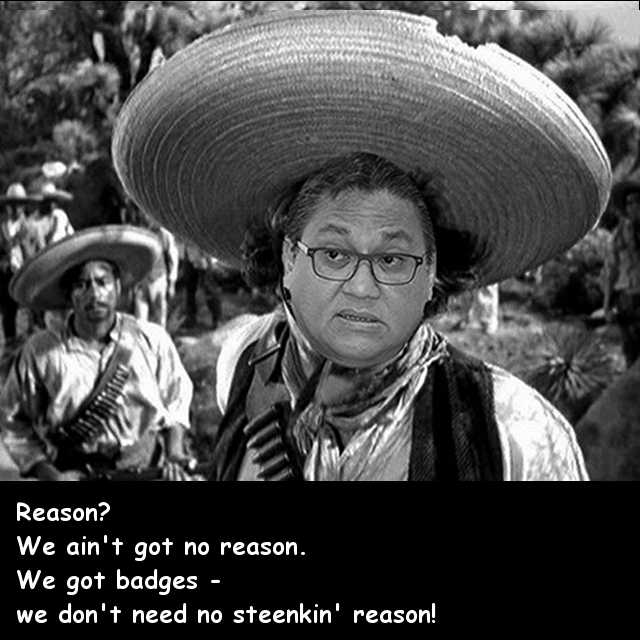
Nobody move, nobody get hurt
Now for most of us, the matter would have ended right there, with that stonewalling from The Deputy Almighty Above. But, for some still unexplained reason, the press just didn't seem to get the message, and continued to seek an explanation from the government. Finally, a new policy was revealed.
May 18:
Immigration director general Datuk Sakib Kusmi confirmed the existence of the new policy: Malaysians who discredit or ridicule the government, in whatever way, can be barred from travelling overseas for three years. Those who disparage the government while abroad will also be barred from travelling abroad again for three years upon their return. He added that the ownership of a Malaysian international passport was a privilege and not a right.
In other words, the punishment for an alleged show of contempt for Malaysia is being forced to remain in Malaysia, i.e. serve a three year sentence in the land that you've shown contempt for. Only inmates who have shown good behavior are granted release, i.e., the privilege of leaving Malaysia.
Keep in mind that it is the government that determines which behavior disparages it. So the government can declare that it discredits the government when an ordinary citizen wishes to leave. When it does, then any ordinary citizen who wishes to leave will automatically be barred from leaving. Only those who would never consider setting foot outside Malaysia will be allowed to leave. But if any such privileged citizens misuse that privilege by actually attempting to leave, their show of contempt for Malaysia must be punished and they too will be barred from leaving.
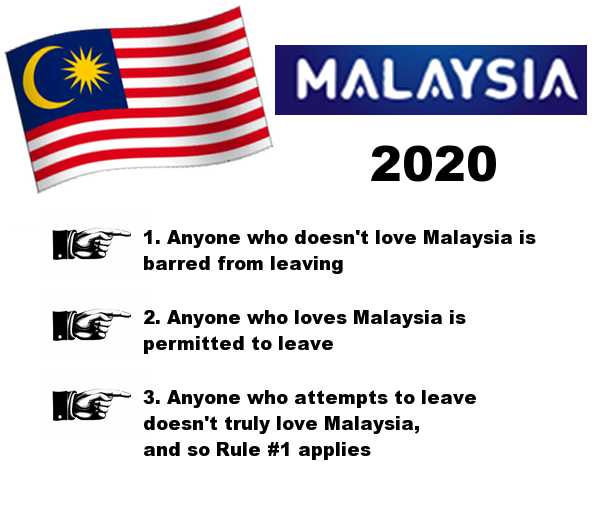
Malaysia: Love it, or Leave it! Love it, because you can't leave it!
The Deputy explains why: v1.0
May 18:
So now that the press had the explanation of what didn't need to be explained from the Immigration Department, The Deputy, in the course of explaining about items banned from leaving prison (Home Affairs is also the parent ministry of the Prisons Department), also explained about people banned from leaving Malaysia:
When asked about the travel ban on individuals who tarnish the country's image, Nur Jazlan said politicians and activists
who tend to make such statements should check with the Immigration Department.
"Maria Chin Abdullah (Bersih 2.0) should check whether or not she is listed by immigration and the same goes for Zunar (cartoonist),"
he added.
The Deputy also added:
“If we feel that that is considered as insulting the country, then we can take action,”
“We measure against the Constitution. If it is insulting religions, races, it can be considered insulting the country,”.
Nur Jazlan cited as examples the Facebook postings and comments by individuals like sex blogger Alvin Tan.
To better understand The Deputy's remark, we must recall the facts of the Alvin Tan case:
- Tan was charged with sedition and two other charges and initially denied bail on grounds of "public interest".
- One week later, seditious Public Enemy #1 was granted bail of RM30,000 (about US$9400 at that time) and ordered to surrender his passport.
- About one year later his passport was temporarily released, to permit him to shoot a documentary in Singapore (a new norm in cases of sedition that threaten the public interest).
- Tan never returned, but instead fled to the US, where he is currently seeking asylum.
So, deprived of any consistent guidelines for determining if one falls into the class of people "who tend to make such statements"
(whatever that means), anyone planning to travel is advised to first
check with the Immigration Department,
to determine if they are one of the
827,921 citizens on the government's blacklist
(4.4% of the
adult citizen population
- more than 1 out of every 23 persons), prohibited from leaving Malaysia. And always remember the words of a Malaysian government spokesman:
“The reality in Malaysia is that there is freedom of expression without fear of prosecution,” he said,
speaking on the condition of anonymity.
The Deputy explains why: v2.0
May 20:
After the new policy was widely criticized (even by fringe elements of the ruling coalition itself), The Deputy proceeded to tweak the explanation of what didn't need to be explained, now denying that the ban was aimed at government critics:
Not for people who criticise the government. Opposition said that. Only for people who commit offence against the Constitution, for example sedition, religion, race, and threat to national peace and harmony and national security.As the public has long accepted that flip-flops are a defining characteristic of politicians, the only curious twist here is assignment of the blame to some mysterious Evil Twin of his in "opposition", who was posing as him.
The prisoners respond
So once it became clear that Malaysia is a prison, there were a variety of vigorous responses from leaders in the social justice biz - the usual parties whose role seems to be acting as the window-dressing needed to give the prison an appearance of a civil society:
- Issued press releases declaring that the travel ban shouldn't be
-
Lim Guan Eng and Lim Kit Siang
Lim Guan Eng said:
Ban those who dare to rob our rakyat’s money or steal our children’s future but do not ban those who bravely fight for fundamental human rights or the right to have a free, fair and clean elections.
Lim Guan Eng's policy is even more severe than the government's, since robbery and other crimes are already punishable under the law - with no travel ban. Yet he urges the government to also add a travel ban as punishment for these crimes.
Lim Kit Siang asked:
Is Malaysia an open and democratic society or has it regressed to become an autocratic and closed society like the North Korean communist regime?
It is difficult to see the value of this Cold War-era rhetorical question, that compares Malaysia to the region's extreme of autocracy. Obviously, Lim Kit Siang would not be issuing such press releases in North Korea. In fact, Malaysia's society has become more comparable to that of its neighbors: the miltary junta in Thailand, and the former military junta in Myanmar. Should Malaysians be satisfied with a civilian regime that is as autocratic as a military junta - but not as bad as the region's most extreme dictatorship?With "opposition" this weak, it's easy to understand how the government attained a level of arrogance that drove it to publicly proclaim no need to justify the travel ban.
- Issued press releases declaring that the travel ban is an abuse of power
-
51 civil society organisations
This is essentially just another way of declaring that the travel ban shouldn't be. To claim that the travel ban is merely an "abuse" of power is to concede that the government legitimately has the power to do so but, in this case, it shouldn't. Otherwise, if the use of power is not legitimate, it is not an "abuse" but a usurpation, and considered a violation or criminal offense. But, apparently, these organizations are willing to concede that citizens have no right to free movement.
- Issued no press releases
- SUARAM (human rights NGO) and Malaysian government's Human Rights Commission (SUHAKAM).
Both organizations had issued statements when MP Tony Pua was banned from travel in July 2015. At that time, SUARAM urged the Immigration Department "to provide a fair and valid explanation over the ban and lift the ban immediately shall they fail to do so.", while the government's Human Rights Commission expressed regret, and called for a kinder, gentler prison state, urging the Immigration Department to reveal the names of those banned from travel.
Not too surprising that both organizations remained silent on Maria Chin Abdullah's travel ban, after their previous insubstantial urgings to the government were totally ignored.
- Issued press releases declaring the travel ban a violation of constitutional rights
- Hakam (the National Human Rights Society),
Malaysian Bar,
civil rights lawyers
While the lawyers concede that there is no law that compels the government to explain the travel ban, they counter that there's no specific provision to bar travel in the Immigration Act. So, the government says "No law says we can't do this!" and lawyers counter with "No law says you can!". In a case of such ambiguity, does anyone really believe government power will not triumph?
Moreover, the lawyers argue that a travel ban violates the right to personal liberty that is guaranteed in the Constitution, so the government is obligated to provide a reason. Eric Paulsen cautioned, however, judges appear to be reluctant to interfere in the decision-making process of the Executive. Gobind Singh Deo, lawyer for MP Tony Pua in his court challenge of his travel ban, pointed out:
That is the question currently pending before courts in Tony Pua's application, whether there is a specific provision to bar a person from traveling and whether it is subject to judicial review and whether it can be challenged if it's not reasonable.
Note that the question of whether Malaysian citizens have a fundamental constitutional right to travel overseas was answered by Loh Wai Kong v Malaysia (1979), when the Federal Court ruled that no such right existed. But in 2009 however, the Federal Court expanded its view, in Lee Kwan Woh v. Public Prosecutor, holding that constitutional liberties must be read generously and not literally.
So, in effect, the lawyers tell us that citizens may have rights that are being violated, but the courts are unlikely to protect those rights.
Zen meditation of the day: If rights are only on paper, and cannot be enforced, do they really exist?
- Issued press releases declaring the travel ban a violation of human rights
-
Amnesty International
Amnesty noted that the government was restricting freedom of movement in order to curb free expression, stating:
The right to freedom of speech is a key human right which the Malaysian people deserve to enjoy just like any other people.
It's important to note the wording: "deserve to enjoy" - not "are entitled to enjoy". That's because "human rights" are just standards: they do not become a binding obligation on a state until that state agrees to be legally bound (by ratifying human rights treaties), and incorporates the rights into its national laws. Malaysia has yet to ratify core human rights treaties - in particular, the International Covenant on Civil and Political Rights (ICCPR). Article 19 of the ICCPR mandates freedom of expression. Article 12 guarantees freedom of movement - including the right of persons to leave a country - and can be restricted only where necessary to protect national security, public order or health. According to Amnesty International and Suaram:
After the 2009 UPR [Universal Periodic Review], the Malaysian government stated that it was “progressively studying the proposal to ratify the ICCPR...and would be in a position to do so once major issues related to the legislative framework are resolved.”
But, seven years later, as dust and cobwebs gather on Malaysia's copies of the ICCPR, it's clear that the failure to ratify has not been due to mere oversight (Messsage to Lim Kit Siang: Even N. Korea has already signed the ICCPR - though it now wants to withdraw. China and Cuba have signed, but not ratified, while Laos and Vietnam have both ratified. So, in this respect, Malaysia is lagging the states commonly described as "communist". Time to upgrade from Cold War rhetoric...).
Parties and signatories of the ICCPR
(from Wikimedia)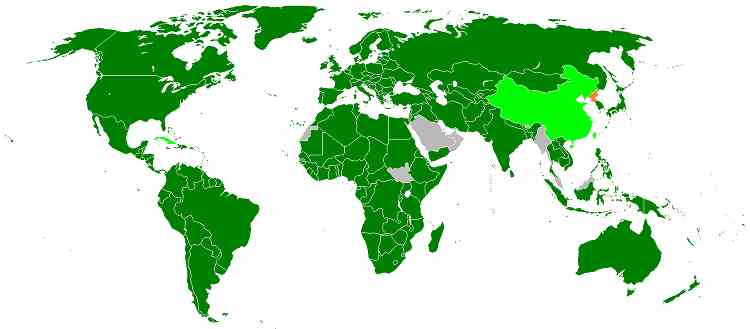
State party Signatory that has not ratified State party that attempted to withdraw (N. Korea) Non-state party, non-signatory As the chart above shows, by not ratifying, Malaysia has positioned itself on the fringe of the international community (168 nations have ratified), together with just 21 other non-ratifying states. Aside from small island nations, the new nation of South Sudan, and Vatican City, the group of 21 consists of just 8 other nations:
- East Asia:
- Brunei, Myanmar, Singapore
- South Asia:
- Bhutan
- West Asia:
- Oman, Qatar, Saudi Arabia, United Arab Emirates
Of course, signing and ratifying ICCPR does not guarantee that a state will protect human rights, as pointed out in The case against human rights:
The truth is that human rights law has failed to accomplish its objectives. There is little evidence that human rights treaties, on the whole, have improved the wellbeing of people...
But from the list above, it is evident that nations not signing or ratifying ICCPR (with the possible exception of Bhutan) are those with little regard for even the ideals of human rights, much less their implementation. Malaysia clearly has found its comfort zone.
Each of the six major human rights treaties has been ratified by more than 150 countries, yet many of them remain hostile to human rights. This raises the nagging question of how much human rights law has actually influenced the behaviour of governments...
The language of rights, untethered to specific legal interpretations, is too spongy to prevent governments from committing abuses...
The prison within
Occasionally, amongst the flurry of press releases, there would float out a dangerously deviant idea:
...maybe we should actually do something...
But how can the public be mobilized to express criticism of a policy that blacklists those who express criticism? It seems that the common response was to draw a line between "government" and "country", and then reassure the public that the criticism is towards the government, not the country.
For example, Sin Chew Daily commentator Tay Tian Yan
explained to us:
The government and the country are two separate concepts. The government is an elected body while a country comes naturally.
It is not a crime slamming a government, but belittling the country is another matter.
But is this dichotomy between "the government" and "the country" correct and useful?
First of all, the travel ban is the policy of the Director General of Immigration (who is appointed by the Yang di-Pertuan Agong), and upheld or struck down by the judiciary. Since none of those are elected bodies, we need to widen Tan's definition of "government" to include all ruling bodies - elected and non-elected.
Then what constitutes "the country"? The common understanding is that "the country" is the territory controlled by the government, and includes the people residing in that territory. So how does territory and population come "naturally"? Are national borders natural? While travelling overland in Sarawak from Miri to Lawas, what natural signs indicate that you have twice exited and re-entered Malaysia? By what natural laws can it be determined who is, or is not, Malaysian?
In another take on this same dichotomy, the 51 civil society organisations (mentioned in the previous section) ended
their press release
with this statement:
Essayist Edward Abbey famously said, “A patriot must always be ready to defend his country against his government.”
Now is another key moment when patriotic Malaysians should stand up and be counted.
Abbey's vigilant patriot seems to be on a quixotic mission, as it's not clear how he can proceed.
What exactly is he defending? Where can he find something to call "his country" that exists independently of his government? His government dictates which lands are or are not a part of his country. Government dictates which people are considered part of the country, which peoples are allowed to go in or out of his country and the length of stay.
Cultural aspects like which languages are permitted and when they can be used, which religions are allowed and how they can be practiced are determined by government. Government defines fundamental social relations, such as when sexual relations or marriage is permitted. Even which things are permitted to be ingested into the human body is dictated by government.
Most importantly, minds are shaped by government. Indeed, the patriot's very conception of his country springs from the education prescribed by the government, and the history that the government constructs. The flow of ideas is also regulated and filtered by government - including the patriot's ideas of freedom, justice, equality, and rights.
So the government not only determines what constitutes the country - what is or isn't Malaysia, and who is or isn't Malaysian - it creates, shapes, or influences virtually every aspect of the country. Then how is it possible to criticize government without also criticizing what it produces - i.e., the country? Can the authoritarianism, corruption, and repression of government be criticized without addressing their presence in society? Can there be any serious criticism of the government policy of Malay supremacy, while under a requirement to declare loyalty to King and country - a country characterized by the plagues of second-class citizenship and economic marginalisation created by that policy?
These questions are not mere philosophical pedantry. Understanding the nature of social conditioning is crucial to the project of social change. Can the patriot - bound by his conditioning to the government's concepts of nation, society, and the individual's role - bring about meaningful change? All his conditioning - from the reciting of the pledge of Rukun Negara, to Hari Merdeka celebrations of the colonizer's new skin color - has been designed to serve the needs of the government. So isn't it likely that his efforts will only further empower the government? Can a patriot achieve anything more than redecorating the cells of the prison?
Ultimately, the false dichotomy between "the government" and "the country" leads to false solutions, such as the false notion that merely changing rulers will change society. New leaders and new reforms will be nothing more than repackaging of the same old sickness, because as long as society is bound to the social conditioning established by the government, then the government (and the prison it creates) lives on inside each of us.
Does the prisoner who seeks freedom pledge loyalty to the prison?
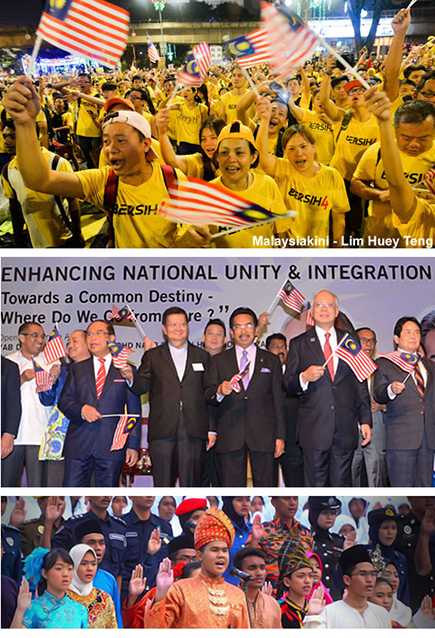
Update: New leaders, new reforms, new opportunity for core change
- 2018-05: New leaders
-
On May 10 2018, Way Way Serious Dude, The Deputy Almighty Above, and the rest of the ruling coalition's Clowntown Crew woke up and found themselves singing along with "Ol' Blue Eyes":
Two days later, Way Way Serious Dude woke up and found himself with a bad case of Traveler 23 blues, as he and his wife were added to the long list barred from leaving Malaysia.
You're ridin' high in April, shot down in May
-- That's Life, sung by Frank Sinatra - 2018-06: New reforms
-
The Immigration Department lifted the travel ban on 265,149 of the 433,708 defaulters on education loans, with the remainder to be removed on June 15. Travel bans by Inland Revenue Board were lifted June 1. Records showed that the travel ban remains on 636,202 people (but at least one government critic, Zunar, has been removed). That means that before June 1, more than 1.07 million people were blacklisted: a 29% increase over the figure given in March 2016.
- New opportunity for core change
-
The speed with which the new government has addressed some of the repressive measures of the previous administration is definitely commendable. But the change that holds the most promise is the emergence in mainstream political discourse of a previously taboo notion: it's time to finally retire race-based political parties and race politics.
And at least one commentator,
Human rights lawyer Fadiah Nadwa Fikri,
has challenged the populace to go further, and examine our social conditioning that upholds our slavery:
But we have to be honest with ourselves — if we have internalised a lot of resentment and hatred...
We also have to change the oppressor that is planted deep within us...
Because the government is not going to do that for us, they might use that against us — because division is necessary to maintain power.
